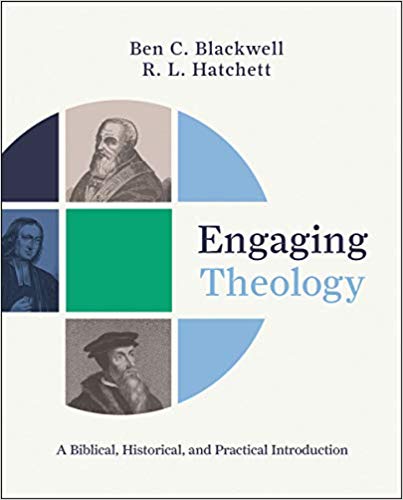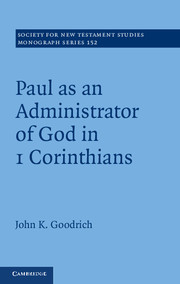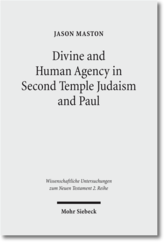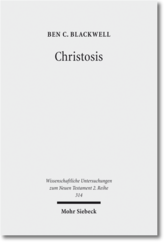One of the exciting developments in recent scholarship is the series Baylor-Mohr Siebeck Studies in Early Christianity (BMSEC) edited by Wayne Coppins and Simon Gathercole. The initial volumes have already received much attention. Wayne has been involved in a range of translation work, and the idea to include some translations of Martin Hengel’s work in Earliest Christian History came from him. I’ve asked Wayne, Associate Professor of Religion at the University of Georgia, some questions about the series and translating German.
1. Before this series you produced several translations of German material. What led to your interest in German scholarship and particularly providing English translations?
After completing my B.A. in Greek and Latin at the University of Georgia in 1998, my friend Jay Weldon invited me to join him in Germany where he was taking part in a UGA exchange program at the University of Erlangen-Nürnberg. Since I was already considering graduate studies in religion, this seemed like a great way to learn German and so I took him up on his offer and moved to Germany in January 1999. I initially planned on staying a year at the most, but at some point I discovered it was basically free to study in Germany (cf. Andy Bowden), which contributed to my decision to enroll at the University of Tübingen, while living at the Albrecht Bengel Haus. At this time, I first discovered something of the riches of German scholarship, especially through my classes with Friedrich Avemarie, Peter Stuhlmacher, Otfried Hofius, Bernd Janowski, Dorothea Wendebourg, and Eberhard Jüngel, but also through my friends and teachers at the Bengel Haus. And my appreciation for the German tradition continued to grow in the course of my M.A. an PhD studies in Durham and Cambridge. During my time in Tübingen, Friedrich Avemarie also gave me my first academic job working as a Wissenschaftliche Hilfskraft for the Tübingen-Durham Resurrection volume, and Peter Stuhlmacher asked me to translate one of his lectures for an upcoming trip to the States. These experiences gave me my first taste of editorial and translation work, and I found that I enjoyed it. This conviction likewise continued to deepen during and after my MA and PhD, when I had the opportunity to translate four essays by or about Martin Hengel. Against this background, I think my interest in translation has three main sources, namely a) my transforming experience with German scholars(hip) in Tübingen, b) the translation opportunities that I received in Tübingen and Cambridge, which helped me to discover how much I enjoyed this work, and c) my growing conviction that translation represented an excellent way for me to contribute to the advancement of my field.
2. What led to your involvement with the BMSEC Series
The short answer is that I wanted to create a framework in which my translation work could be part of a larger vision for facilitating increased dialogue between German-language and English-language scholarship. For a longer answer, see my interview with Michael Hölscher.
3. What do you hope this series will accomplish for scholarship?
Since I spend much of my existence translating and editing volumes for the series, it will come as no surprise that I have great hopes for it! Let me outline these in three points.
(a) First, I hope that each volume in the series will make important contributions to concrete areas of scholarship within the field. For example, I hope Jens Schröter’s book From Jesus to the New Testament will be taken up in discussions of historiography, historical Jesus, Pauline studies, Luke-Acts, the canon, and theology of the New Testament!
(b) Second, beyond their individual contributions, I hope that each volume will serve as a window into the wider world of German scholarship and thereby enable English-speaking scholars to become more conversant with emphases and developments that characterize cutting-edge German scholarship.
(c) Third, I hope—or at least dream—that the series will contribute to a resurgence of interest in German scholarship on early Christianity and that this will, in turn, motivate a new generation of scholars to commit themselves to learning German, so that they can interact even more fully with the German tradition in their research and teaching.
4. How do you choose which books to translate? The volumes so far have been recent books. Will the series also pick up some older material?
The short answer to your first question is that we—i.e. Simon Gathercole and I in conversation with Carey Newman and Henning Ziebritzki—look for works that are of incredibly high quality and written by respected authors, without requiring that they fit a certain genre. For example, the first five volumes will include two collections of essays (Schröter and Frey), three monographs (Konradt, Markschies, and Hengel/Schwemer), and one commentary (Wolter). For a longer answer, see my interview with Clifford Kvidahl (Part I and Part II).
It is not impossible that the series will include some older material, but I doubt it. The reason for this is because I think much interaction with German scholarship is too backward looking. When people think of German New Testament scholarship they often think only of the formative period of the discipline or of the contributions of Bultmann and his students. This is not, of course, all wrong, since it is absolutely essential that scholarship continue to grapple with the contributions and issues raised by such key figures and movements (cf. e.g. here and here ). At the same time, part of my vision for the series is to communicate with all due clarity that contemporary German scholarship on early Christianity is alive and well, so that the future of German scholarship also lies in the present and not merely or even primarily in the past. And for what it is worth, I also think that engaging contemporary German scholarship is often an especially fruitful way to discover the strengths and shortcomings of past German giants, or at least this has been the case with my interaction with Schröter and Markschies in relation to Bultmann and Harnack.
5. Will you tell us a little about what will be out at SBL in November 2014 and in the future in the series?
The volumes that have been planned out so far are as follows:
Vol. 1 (2013): Jens Schröter, From Jesus to the New Testament (cf. my blog posts on this volume).
Vol. 2 (2014): I am very excited about this year’s BMSEC volume, namely Matthias Konradt‘s book Israel, Kirche und die Völker im Matthäusevangelium / Israel, Church, and the Gentiles in the Gospel of Matthew, not least because of the ringing endorsements that the German and English versions have received from Ulrich Luz (‘die wichtigste Arbeit über das Matthäusevangelium der letzten zehn Jahren’, Evangelium Ecclesiasticum, p. 285) and Dale Allison (‘Israel, Church, and the Gentiles in the Gospel of Matthew is full of original observations and fresh arguments. Konradt has built a new foundation for all future work on the crucial topic of Israel and the Church in Matthew’s Gospel’, Endorsement for the English Edition). And in addition to the high quality of the argument, I think that Kathleen Ess has done an absolutely wonderful job with the translation (cf. my blog posts on this volume).
And I am, of course, equally excited about my and S. Brian Pounds‘ translation of Jens Schröter’s book Jesus von Nazaret: Jude aus Galiläa – Retter der Welt / Jesus of Nazareth – Jew from Galilee, Savior of the World, which will also be at this year’s SBL, though not as part of the BMSEC series (cf. my blog posts on this volume).
Vol. 3 (2015): The next volume, which I have recently submitted to Baylor, is Christoph Markschies‘s book Kaiserzeitliche christliche Theologie und ihre Institutionen: Prolegomena zu einer Geschichte der antiken christlichen Theologie / Christian Theology and its Institutions in the Early Roman Empire (cf. my blog posts on this volume).
I think that this impressive volume will prove to be a major contribution to the study of early Christianity in the second and third centuries and especially to key issues such as (1) the value of an institution-oriented approach to studying early Christianity, (2) the need to attend to diverse institutional contexts, such as free teachers and Christian schools, the Montanist prophets and their circle, and the Christian worship service and its prayers, (3) the relationships between the New Testament canon and Christian institutions, and (4) the advantages of the complementary model of the identity and plurality of ancient Christianity as an alternative to competing models such as Walter Bauer’s Cultural Protestant model of ‘orthodoxy’ and ‘heresy’ and the Jesuit model of the ‘inculturation’ of Christianity.
The next volumes planned for the series are:
Vol. 4 (2016): Wolter, Michael. Das Lukasevangelium / The Gospel According to Luke. Translated by Wayne Coppins and Christoph Heilig. Baylor-Mohr Siebeck Studies in Early Christianity 4. Waco, Tex.: Baylor University Press (cf. my blog posts on this volume).
Vol. 5 (2017): Frey, Jörg. Die Herrlichkeit des Gekreuzigten. Studien zu den Johanneischen Schriften I / The Glory of the Crucified One: Studies on the Johannine Writings I. Translated by Wayne Coppins. Baylor-Mohr Siebeck Studies in Early Christianity 5. Waco, Tex.: Baylor University Press (cf. my blog posts on this volume).
Vol. 6 (2018): Hengel, Martin, and Anna Maria Schwemer. Jesus und das Judentum / Jesus and Judaism. Translated by S. Brian Pounds and Wayne Coppins. Baylor-Mohr Siebeck Studies in Early Christianity 6. Waco, Tex: Baylor University Press (cf. my blog posts on this volume).
6. For those thinking about PhD studies or at the early stages, what advice do you have for them about how to acquire a better understanding of German? Is there a particular author or two that you think is good to ‘cut one’s teeth on’?
Hard to say. If at all possible, spend some time in Germany (or Switzerland etc.). But even if you can’t make it to a German speaking country, I suggest combining a “German-for-reading” approach with at least some “spoken German”. I’ve never used it, but David Lincicum has suggested that slowgerman.com is a helpful resource for the latter. For the former, I have heard that April Wilson’s German Quickly is a good place to start. After that you might want to move on to a German reader or work through my model sentences. But it could be just as effective to begin working through German texts that are directly related to your research interests. But if you take the latter approach, don’t start with the German text alone. Instead find a work that has been translated on your topic and work through the original German with reference to the English. In terms of tools, I have provided links to some of the better dictionaries on my resource tab, which also includes links to other sites for learning German. Finally, the serious student might consider participating in one of Thorsten Moritz’s courses.
Good question. Chris Tilling has suggested that Udo Schnelle is a good author to start with due to his clear writing style, and this could be done with reference to Eugene Boring’s fine translations, e.g., Paulus/Paul or Theologie/Theology. Martin Hengel’s German is also fairly straightforward, though it is problematic that the English and German versions often differ greatly in length. But some of his essays might work well, for example the essays that I translated in Earliest Christian History. Jens Schröter’s German is more complex in Von Jesus zum Neuen Testament, but he has clearly attempted to write in a very accessible manner in Jesus von Nazaret, so I think it could work well to use this volume in conjunction with the English translation, Jesus of Nazareth (cf. here). Finally, Peter Stuhlmacher could also be a good option, e.g., Der Brief an die Römer/Romans or Biblische Theologie des Neuen Testaments/Biblical Theology of the New Testament [Forthcoming; trans. Daniel Bailey].
7. Aside from your translation work for this series, what else are you working on?
Much of my recent research has carried forward past projects. Building on my previous publications on freedom, I wrote encyclopedia articles on freedom for the Encyclopedia of the Bible and its Reception and the Oxford Encyclopedia of the Bible and Ethics. More recently, building on my RBL review of Ernst Käsemann’s posthumously published essays, I submitted an article titled ‘Revolution and Violence in Ernst Käsemann’s Radically Lutheran Theology of Liberation’, which may or may not be accepted and published. My most recent teaching and research interests are squarely focused on the Synoptic Gospels, esp. Mark, but to date my only publication in this area is my 2012 Tyndale Bulletin article ‘Sitting on Two Asses? Second Thoughts on the Two-Animal Interpretation of Matthew 21:7’. If another book-length project emerges for me in the future, then I suspect it will be related to the Gospel of Mark.
Many thanks to Wayne for answering these questions. Be sure to check out his immensely helpful blog German for Neutestamentler where he regularly works through a section from a German author explaining the grammar and reflecting on the historical and/or theological claims.











You must be logged in to post a comment.